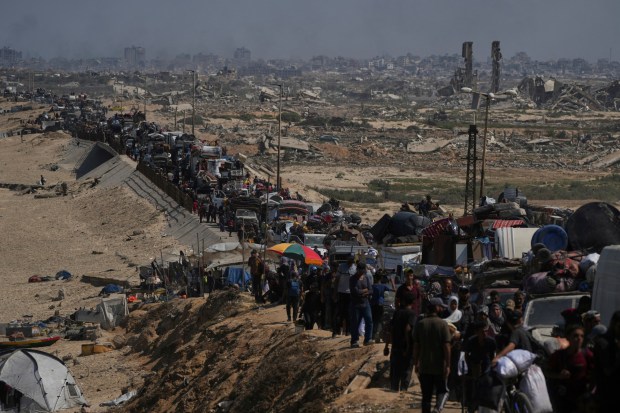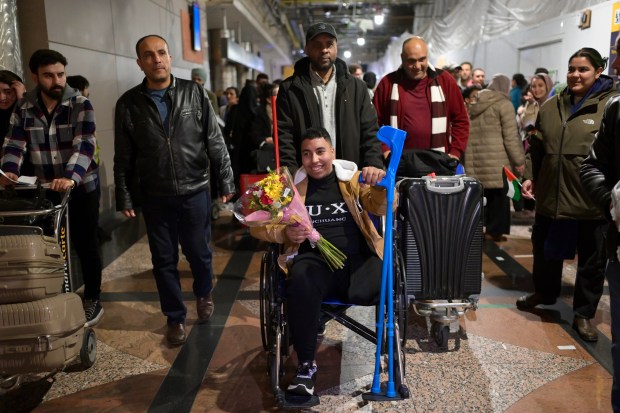For 730 days, I have watched Palestinians live-stream their own genocide from Gaza to the world. Two years have passed. No matter what we call it, ethnic cleansing, apartheid, genocide, words that once carried the weight of human horror have been ignored, even as the crimes themselves unfold in plain sight.
But the truth is simpler than any label: we are human beings, never less than, never disposable, entitled to the same recognition, equality, and self-determination that all people deserve.
This is not about semantics. This is not about Hamas. This is not about Benjamin Netanyahu. This is about decades of Palestinians insisting on their right to exist.
Those of us who speak out find ourselves relentlessly searching for some phrase or video that might pierce the willful blindness of people who say, “I don’t want to watch that.”
In that spirit, I feel compelled to search for the one thing that will make you stop and pay attention. I want this piece to help each reader discover what moves them to watch. For some, it might be the sheer scale of the humanitarian crisis. For others, it could be the policy failures. And for some, it may be the testimony of genocide experts who can no longer stay silent. Whatever it is, I hope something here reaches you.
As Palestinians insist on their right to exist, the world sees cruelty that defies imagination. Hospitals turned into death traps. Newborns found decomposing in incubators after doctors were driven out at gunpoint by the Israeli army. A five-year-old boy with no legs, dragging himself across the sand, one hand stuffed inside a rollerblade, the other clawing forward. Families, ethnically cleansed, staggering out of burned homes only with what they can carry on their backs. Overhead, the unrelenting buzz of drones. Around them, the stench of decomposing bodies unrecovered in the rubble because the living are too starved and hunted to dig graves.

Two years ago, the world was shaken by the attack on October 7. What has followed has been nothing short of catastrophic. As of September 2025, Gaza’s death toll is estimated to be nearly 65,000 people. The medical journal The Lancet has estimated more than 64,000 deaths from traumatic injuries alone, which means the actual toll, when famine, untreated illness, and lack of medical care are added, is far higher.
That already rivals or exceeds the death tolls of many recent wars. Ukraine has recorded about 50,000 civilian casualties since 2022. Afghanistan, in its final years, saw deaths in the hundreds. By contrast, Gaza’s losses are overwhelmingly civilian, tens of thousands of children, parents, doctors, teachers, journalists, making it one of the deadliest conflicts of our time.
This is not a battlefield; it is the obliteration of an entire territory, deemed “uninhabitable” by the United Nations’ undersecretary for humanitarian affairs. Whole sectors of Gaza, between 78% and 95%, are damaged or destroyed.
Doctors inside Gaza tell stories that defy comprehension. One British surgeon, returning from Gaza, described to National Public Radio’s Morning Edition what he called “systematic cluster injuries.” One day, bullet wounds were concentrated in heads, the next in abdomens, the next in groins, as if civilians, even children, were being used for target practice. Some were shot while standing in line for food. Mothers in labor have been shot in the stomach, and fertility clinics bombed. The human toll is staggering.
The United Nations reports that Gaza now has the highest rate of child amputees per capita of any conflict in modern history. Many have undergone amputations without anesthesia or even care from a doctor because Gaza’s medical system has been deliberately decimated. These deliberate attacks on civilians strip children of their future, mobility, and dignity.
Starvation is claiming lives with equal brutality. Babies, starving and skeletal, breathe weakly, translucent skin, stretched thin over bone, eyes empty, silently pleading for the nourishment that never comes. ABC News reported that 27 people died of hunger in just three days. In total, at least 113 Palestinians, 81 of them children, have died of famine and malnutrition. One in four children and pregnant women are malnourished. Cases of severe malnutrition in children under five have tripled in recent weeks. Famine is not an accident. It is a weapon.
Journalists, too, are paying the price. Bearing witness in Gaza has become one of the most dangerous professions in the world. According to the Costs of War project, at least 232 journalists have been killed. That is more than in World War I, World War II, the Vietnam War, the Yugoslav wars, and the Afghanistan War combined.
International law is not vague about this. The 1948 Genocide Convention defines genocide as any one of the following: killing members of a group; causing them serious harm; deliberately inflicting conditions of life calculated to destroy them; preventing births; or forcibly transferring children. It takes only one to qualify. Gaza meets at least four.

Last month, the UN Independent International Commission of Inquiry concluded that Israeli forces are committing genocidal acts and that statements from Israeli officials provide direct evidence of genocidal intent.
Even Holocaust scholars, who for decades resisted overusing the word genocide, now say the label applies.
Daniel Blatman, Professor of Holocaust Studies at the Hebrew University of Jerusalem, said: “I have been engaged in researching the Holocaust for about 40 years. I never imagined in my worst nightmares that the Jewish state would bomb starving children to death.”
Omer Bartov, Dean’s Professor of Holocaust and Genocide Studies at Brown University, wrote that Israel’s actions “can no longer be denied” as genocide. Amos Goldberg, Raz Segal, and Shmuel Lederman have also raised alarms. When the most cautious, expert voices invoke the term, the world should take notice.
The Trump administration’s 20-point “peace plan” reads more like an ultimatum than diplomacy. It envisions a “New Gaza” under the Palestinian Authority, but only after reforms dictated in Washington and Tel Aviv, including abandoning all legal cases against the U.S. and Israel at the ICJ and ICC. And as Axios and Dawn report, Netanyahu revised a draft previously agreed upon by the U.S., Arab, and Muslim states, making it unmistakably clear that Israeli forces will remain in Gaza indefinitely.
In other words, the price of self-rule is surrendering accountability.
What governments refuse to say, the public increasingly does.
A Quinnipiac poll found that half of all U.S. voters, and 77% of Democrats, believe Israel is committing genocide. That’s nearly as many Democrats who identify as pro-choice (83%). Gallup reports that only 32% of Americans approve of Israel’s actions in Gaza, while 60% disapprove. CNN found that since 2017, Democrats have gone from slightly favoring Israel to strongly siding with Palestinians, a 56-point swing. Among younger Democrats, ages 14 to 49, the swing is even more dramatic: more than 70 points. That is not a minor shift. It is a moral earthquake.
And in a twist few predicted, cracks are appearing on the right. Some right-wing politicians, pundits, and activists, once Israel’s staunchest defenders, are now calling the war what it is: genocide. Many frame it in “America First” terms, arguing U.S. resources should not fund endless wars abroad. Their motives may differ, but the effect is the same: the once-solid consensus around unconditional support for Israel is crumbling.
For those who speak out, the default label is often “antisemitic.” But Kenneth Stern, the drafter of the International Holocaust Remembrance Alliance definition, warns that conflating criticism of Israel with antisemitism weakens the fight against genuine hatred and is “weaponized” to silence dissent. Criticizing Israel is no more anti-Jewish than criticizing China is anti-Buddhist or the UK anti-Christian.
Across the globe, Palestine’s legitimacy is gaining recognition. As of last month, 157 of the 193 UN member states, more than three-quarters of the world, have formally recognized the State of Palestine. Recognition is no longer symbolic or fringe; it is the stance of the overwhelming global majority.
And yet, in April 2024, the U.S. vetoed a UN Security Council resolution that would have advanced Palestine to full UN membership. The General Assembly is ready. The world is ready. Only Washington and a handful of allies stand in the way.
So why are those bodies still lying in the rubble? Why do newborns decompose in their incubators? Why must a five-year-old crawl on the ground with a rollerblade for a leg?
Because the world looks away, paralyzed by fear, profit, and power, and leaders enable genocide with their votes, too afraid of donors or elections to name the crime, even as Gaza buries its children.
Suppose legal accountability, moral clarity, and global awakening converge. In that case, these years may not only mark the darkest of times but also the beginning of a breakthrough, not just for Gaza, but for the integrity of international law and the conscience of humanity.
Sen. Iman Jodeh is a Colorado state lawmaker who is Palestinian.
Sign up for Sound Off to get a weekly roundup of our columns, editorials and more.
To send a letter to the editor about this article, submit online or check out our guidelines for how to submit by email or mail.
